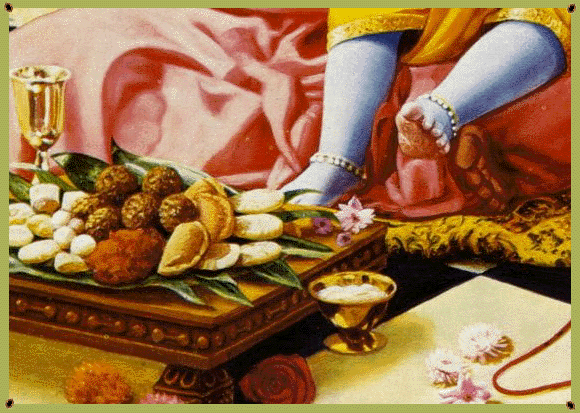|

|
|
OTHER PRINCIPLES
|
|
* ABSENCE OF RESTRICTION AND REGULATION
|
|
* THOROUH FAITH ON LORD'S PRASAD
|
These principles belong to the world of God's worship.
|
There exists power and light of Lord in every atom of the universe. "Sarvam khalu idam brahma"- Everything is this Brahman. According to this principle the VEDA declared that in every atom of the creation there is power, light and purity of the Lord. The flowing Ganga is pure all the time. By immersing in it, sinfulness gets cleansed but never the Ganga becomes impure by the sin. Air is spread throughout the earth. Everywhere many sinners inhale and exhale air, even then it cannot become impure. So also, any of the five elements or entities of the nature-earth, water, sky, air and light. Though it burns off several impurities, dead bodies, the fire always remains pure and untainted. Entire creation which is filled with these five elements is pure all the time. When the object is narrow, then only regulations and restrictions arise. When the freely flowing Ganga is made to flow along a small canal and its waters stored in a pit, within a small time it becomes contaminated and spreads foul smell. Similarly the mind that was once unlimited and pure had developed bond with the narrow objects of Prakriti and fell to limitation and impurity.
|
There exists power and light of Lord in every atom of the universe. "Sarvam khalu idam brahma"- Everything is this Brahman. According to this principle the VEDA declared that in every atom of the creation there is power, light and purity of the Lord. The flowing Ganga is pure all the time. By immersing in it, sinfulness gets cleansed but never the Ganga becomes impure by the sin. Air is spread throughout the earth. Everywhere many sinners inhale and exhale air, even then it cannot become impure. So also, any of the five elements or entities of the nature-earth, water, sky, air and light. Though it burns off several impurities, dead bodies, the fire always remains pure and untainted. Entire creation which is filled with these five elements is pure all the time. When the object is narrow, then only regulations and restrictions arise. When the freely flowing Ganga is made to flow along a small canal and its waters stored in a pit, within a small time it becomes contaminated and spreads foul smell. Similarly the mind that was once unlimited and pure had developed bond with the narrow objects of Prakriti and fell to limitation and impurity.
|
The all-pervading transcendental consciousness which mingles and lives along with the Lord would get perverted when attached to Maya. When a Bhavuka of Lord Krishna utters 'Krishnarpanamastu' (may this be dedicated to Krishna), the object loses its earthly impurity and becomes a sacred Prasad of the Lord. The son of Kabir chanted the Holy Name 'Ram' many times before a dead-body. But it hasn't regained life. But when Kabir uttered Ra..m.only one time the dead body came back to life. Above majestic supernatural event occurred as the Transcendental Divine Feeling (Bhav) was attached to outer sound.
|
Sage Bharata's life reveals us that he had developed intense attachment to a deer and as a consequence the great sage had to born as a deer in his next birth. In the same manner, the broad consciousness and love when arrested and shackled to a small object degenerates into mean and sordid lustfulness. Any thing broad cannot be impure. No restrictions or regulations can enshackle it. A broad river flow won't become impure even by mixing of any number of dirty canals.
|
In the Ashram of Sage Kanva, animals of mutually opposing nature like cows, tigers, deers and snakes lived together oblivious of their natural qualities. The Sage's Divine Love and consciousness had filled the entire ashram premises and that dissolved their natural enmity. As a result they lived in mutual friendliness.
|
The Scriptures instruct us:
|
|
Bhakthya Bhagawatam gneyam na tikaya na vyutpatya
|
The Bhagawata is understood only by devotional feeling not by the meaning or expression of words used in it. That is, the devotional feeling is the most important quality, not any rule or restriction. The rules and restrictions do not affect a broad entity. The maya shakthi works only on those persons who are yielded to limitations. Maya's function is to cause limitation to love and vision of Jeeva, whereas, the love of the Lord has no limitation. Persons yielded to maya regard some people as their own and others as strangers; this portion is mine and that is yours; this country is mine and that is yours. All rivalries and disturbances originate out of such narrow view and sight.
|
|
Chaturvarnam maya srushtam
|
"The four 'varnas' are created by me" declared Geetacharya in the Geeta. In the view of the Lord, there are no obstructions or limitations relating to 'Varna'. Even among children of same parents different 'Varna' may exist. This fact has a spiritual authority.
|
It was told in the Anusasana parva of Mahabharata that a couple invited a Mahatma to their house and served him with devotion and respect. Later, there requested the Mahatma to reveal the 'varna' of their children with the help of his higher vision. The Mahatma saw them and called one child as Brahmin, other as Sudra. He clearly told about the varna of each child. Therefore a Brahmin parents may beget children of different 'varna'.
|
Principally due to three reasons the broad vision of Jeeva is split, narrowed and diverted to several directions.
|
|
1. Affect of Heart Glands (Hridaya grandhi)
|
Ego and narrow sight are seen even among Gods like Bharma due to the function of Hridaya Grandhi.
|
|
2. Creating divisions of 'Time'
|
Creating partitions of otherwise natural and limitless 'time' by dividing it into auspicious and inauspicious periods, proper and improper dates and weeks etc.
|
|
3. Losing comprehensive vision
|
Loss of broad and holistic vision on the philosophical doctrines and suspecting each and every pronouncement of Scriptures..
|
Moreover, the consequence of Karma (result of fruitive actions) is divided in two ways; one as result of Karma (karma phala) and the other is vestige of Karma (Karma vasana), besides there are several divisions in the calculation of time like Mahayuga, Kalpa, Varsha, ghadiya and vighadya Gradually the initial four varna were divided into hundreds of castes and creeds. A person who is treated by others as 'low caste' might belong to Brahman Varna and is adored by the world. So also a person of Sudra Varna may be a saint or a seer or a great scholor.
|
But the VEDA emphatically declared that in the presence of Lord all these divisions and narrowness would get destroyed comprehensively.
|
|
| |
| |
| |
| Bhidyate hridaya grandhi |
| Chidante sarva samsayah |
| Sheeyantasya karmani |
| Tasmin drishtiparavare. |
| ---- |
| |
| |
With the very sight of the Lord, heart glands that create 'me and mine' would get destroyed. All doubts and misgivings would vanish. All sorts of Karma and Karma vasana (vestiges of karama) disappear. 'Maya metam tarantite'- the Jeeva overcomes maya as enunciated in the Geeta and enters the realms of the Lord.
| |
| |
-
| |
|
|
God is all Supreme, wherever his sight descends that place or object becomes Holy and becomes His Prasad. For his Prasad there cannot be any regulation or restriction. The Prasad remains Pure and Holy under any circumstance and time. His sight is so powerful that any impure object forthwith transforms into pure and sacred. The Holiness and Sanctity of 'prasad' should not be measured from the view point of ordinary and mean Jeeva and it should not be left unaccepted. Such acts ultimately lead to 'vaishnavaparadha' (ill-treatment Holy objects or persons).
|
Every one has right to have the sight (darshan) of the Lord in the Vaikuntha. To create restriction and regulation to his darshan or service ultimately becomes 'vaishnavaparadha'. By obstructing Mother Lakshmi from meeting the Lord and by restricting the movement of Sages Sanaka and Sananda as there were meeting the Lord Maha Vishnu, the Portal-keepers of Vaikuntha, Jaya and Vijaya, committed 'Vaishnavaparadha'. Eventually they had to assume mean births as demons on the lowly world like the Earth.
|
Sabari belonged to a low caste and was residing in a forest. She dedicated herself to Sri Rama. The other Rishis of the forest had prohibited all not to take bath in the tank where she was taking bath as she belonged to a low caste. But Lord Rama while proceeding to meet Sabari did not even glance at the congregation of Rishis stood on either side of his way. Sri Rama went straight to the hutment of Sabari. Later when she died he performed her last rites with his own hands. The very behaviour of Sri Rama reveals with thousand voices that there should not be any restriction and regulation in the Service of Lord or His devotees. Therefore Harivamsaji condemned any restriction in partaking the Lord's Prasad.
|
One day Harirama Vyasa who was a disciple of Hita Harivamsaji went to Banke Bihari temple. He found temple was closed. He saw a low caste woman carrying the 'prasad of Biharji' in a container which she kept on her head. He prayed that woman, "Mother, please give me Biharji's prasad a bit that is kept in your container". "Swami, I belong to a low caste, how I can give it by touching with my hand". She replied. Forthwith a small boy's leg appeared there and it kicked the container, then the prasad kadi (a butter milk and dall preparation) fell down on the floor. The Mahatma then ran to it and partook the same with immense devotion. Having known the incident many people criticized him and ostracized him later.
|
Afterwards, Harirama who was also a great poet, wrote a verse which meant 'He! Radhe! How kind you are, with this Kadi you have protected my penance from these mischievous crowds'.
|
Considering this verse as a great instruction, the residents of Vrindavan even today sing it with love and respect.
|
In all, what Harivamsaji instructs is, the Prasad is the personified direct grace of the Lord.
|
Whoever possess afore detailed five Divine qualities within their heart, that devotee will surely be shining with 'Radha Bhav'.
|

